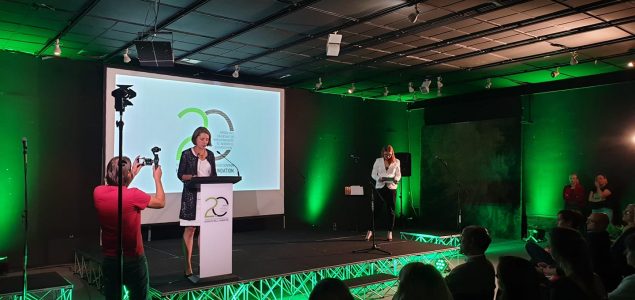Ellen Ueberschär: “As European citizens, we must stand up against nationalism: politically, legally, with the means of civil society and in case of need, even militarily”
Povezani članci
- People in nursing homes left at the mercy of private individuals
- RiTE Gacko: Big reception on a sinking ship
- Mostar Parking is setting up Lanaco with a job, they even forgot to proofread some parts of the document in Serbian
- Shelter for dogs used as a site for criminal activities
- SDA tycoon Haso Pekušić won almost 70 million marks in tenders, he is building in Mostar almost like Austro-Hungary
- FINANCIAL CHAOS IN THE HEALTH INSURANCE INSTITUTE OF HNC: Irregularities and concealment of documentation discovered, the Institute orders a new audit

For the celebration of 20 years work of the Heinrich Boll Stiftung Organization in Bosnia and Herzegovina, that had been held in History museum in Sarajevo on September 7th 2019, Ellen Ueberschär president of the Heinrich Boll Stiftung Organization in Germany gave a speech that we convey entirely:
“Dear Ladies and Gentlemen,
first of all, welcome to the 20th anniversary of the Heinrich-Böll-Foundation Sarajevo. We are very happy to have you all here tonight: partners, friends, colleagues, longtime companions, former directors and members of staff from 20 years.
The establishment of this office 20 years ago, in 1999, had a high symbolic importance. The wounds of 1425 days of siege were still deep. The war was still present in heads and hearts. The losses and traumata hurt and the political situation was far from stable. The fact that Heinrich Böll foundation, which is affiliated with the German Green party, decided to open an office in Bosnia-Herzegovina at that time was a political statement: The multi-ethnic Bosnia-Herzegovina was and is an important part of Europe. Here, it will be decided whether Europe is able to stabilize peace in the Balkans. The foundation was willing to become an active part of any engagement towards a sustainable peace.
5 years after the end of the Bosnia war and the siege of Sarajevo, the establishment of this office wanted to express the clear commitment of the Green movement in Germany that the fate of this small country and this city remains an important concern. Because for too long, many in the green movement looked away: they ignored or underestimated the potential conflicts in a multiethnic, postsocialist society.
That is why – and we have to self-critically confess this point – the attention was too little, when Bosnia-Herzegovina became a victim of ethnopolitical aggressions and war crimes.
The genocide of Srebrenica. This monstrous crime in the middle of Europe is a blot in European history until today, a reminder of the failure of early warning systems and prevention mechanisms. For the Greens in Germany, Srebrenica became a turning point. The Greens, influenced by the peace movement in Western Germany, came to understand that military engagement can be a necessary means to prevent war crimes. This lesson was clear and it was bitter.
The sorrow of the relatives about the murder of their husbands and sons lasts until today. And Western and Northern Europe learned that nationalistic wars of aggression, massacres and war crimes like the besiegement of this city, don’t just stop when we look away or remain silent.
As European citizens, we must stand up against nationalism: politically, legally, with the means of civil society and in case of need, even militarily.
The autumn of 1999 was a time of cautious hope: Many were aware of the fact that the Dayton agreement was a ceasefire only and not a good foundation for a multi-ethnic, democratic state under the rule of law. But at least: the ceasefire was intact and the work for a new, functional state had begun.
While next door the Kosovo policy of Slobodan Milosevic could only be stopped by a NATO intervention, the time here seemed ripe for a strong and long-term engagement of Europe. Heinrich Böll Foundation and many other European foundations and institutions offered their support to Bosnia-Herzegovina to overcome the consequences of a horrible war, to achieve economic reconstruction und build up functional institutions. The “Office of the High Representative“ together with the famous „Bonn Powers“ embodied real power, the “Stability Pact for South-Eastern Europe” opened up new political and financial resources. And it seemed to be only a matter of time until Dayton would be reformed, until the ethnically biased proportional thinking would come to an end and a constitution of democracy and rule of law would come into force.
And here we are today – and we see: The ethnic tensions still exist, the institutional reforms are in a deadlock, state structures are paralyzed by the stranglehold of nationalist actors, authoritarian influences from Russia and Turkey increase, signs of islamization can be observed, the economic success did not materialize like we hoped it would, and many young people still leave the country looking for a better life in Northern and Western Europe.
When we walked through Srebenica last year together with two young men, who were willing to build up a cultural centre for young people in the middle of despair and investment ruins, they were approached by two elderly citizens: What do you still do here? Why didn’t you already leave?
We all know: These are no easy conditions for optimistic policies. The absence of whole generations threatens every fragile plant of democratic culture – much more than the election of a bad politician.
Since 1999, for 20 years, the hbs and its highly engaged directors and staff members see their task in cooperating with you, dear partners of Bosnian civil society. This is what gives us hope. This is what drives us.
- For us, it is important that the war and the war crimes of the 90s are addressed. This is a historical, a political, a legal and a psychological task, in which we will only succeed if we strengthen the networks in the Balkans which stand up against nationalism.
- For us, it is important to break through the narratives which fuel nationalism again and again. Moreover, we will continue to counter all attempts of glorifying war crimes or war criminals. We want to tell a different story of a successful and peaceful coexistence in a multiethnic state.
- For us, it is important to strengthen the democratic public space. This means we need a strong civil society, independent and free media, a lively cultural scene.
- For us, it is important that the human rights of all Bosnian citizens are protected, independent of their sex, their ethnicity and their sexual orientation. And to protect and support those who do exactly that with courage – just like Stefica Galic.
- And it is important for us to draw the attention to the many urgent environmental problems of the country: from the dramatic air pollution to the preservation of rivers.
You all know the story of Sisyphos, who rolls his stone uphill. And once he reaches the top, the stone rolls down again. Sometimes, it seems like this is the destiny of our work here in Bosnia. There is not much left from the moment of hope in 1999. But: You are all here. You love this country and this city with its amazing history, from which we could learn so much for Europe. We will not give up hope, we will continue, we will roll up this stone again and again – we will roll it to Brussels and to Berlin, we will roll it to Srebenica and to other cities in the Balkans. We will keep it up and continue to support you all.
A Bosnia-Herzegovina of democracy and rule of law, as a member of the European Union – this will remain the goal or our work as a foundation and as the German Green movement.
We are grateful to each and all of you for our shared work, the discussions, the critique and your trust. It looks like we still have a long way to go together. We are looking forward to the next 20 years!
Let me close by thanking all those who have shaped the work of our office over the many years. Without you and your commitment and care nothing of the things we celebrate today would exist:
Azra Dzajič-Weber, founder of the office and director until 2008
Mirela Grünter-Dečevič, staff since 2005 und director until 2015
Senad Vladovic, staff since 2000, technical assistant, driver and good soul of the office
Diana Hadzibegovic, our reliable financial coordinator since 2001
Amela Sejmenovic, with all her patience, democracy coordinator since 2002
Alma Sukic, office manager since 2002 and responsible for keeping all strings together
Lejla Taljanovic, our accountant since 2013
Jasminka Bjelavac, our ecology coordinator since 2014
…and finally Marion Kraske, director since 2015″


 ENG
ENG





























